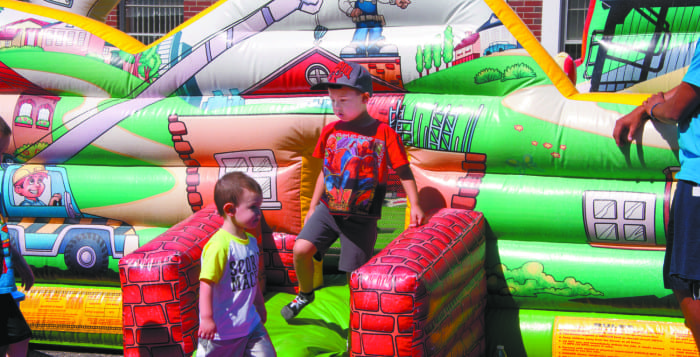On your mark, get set — no.
Smithtown officials are taking another look at the way the town approves festivals, parades and similar events that close major roadways in different parts of the town. Before Tuesday’s special Smithtown Town Board meeting, Supervisor Pat Vecchio (R) and Town Clerk Vincent Puleo discussed complaints both of their offices have received after recent events closed portions of Smithtown, citing negative effects on business and residential life.
“It discombobulates people,” Vecchio said, citing one recent grievance to his office about a town event putting a damper on business. “This is a beautiful town, but this is not the first complaint we have received. I think we need to revisit the process.”
St. James resident Scott Flugman prompted the discussion via a letter he penned to Vecchio’s office, citing traffic issues barring his ability to get around town during an outdoor race event in his town on May 31. He said it took him nearly an hour to drive his son home from a friend’s house, who lives roughly 10 minutes away.
“This is a dangerous and grave inconvenience and should not be allowed to happen again,” the letter said. “We could not pick up our children, we were late to their sports and other activities and we were put at risk for a potentially serious traffic accident. Please have more consideration for the impact on the community when planning these races in the future.”
Currently, the town lists a parade, a run or a similar event in the correspondence section of its Town Board meeting agenda. The events are read aloud at two consecutive meetings, and the public can weigh in. But Vecchio said that process only targets residents who actually tune in to each agenda item at any given meeting.
“We have two readings. But there is no time in between for anyone to say, ‘Wait a minute,’” Vecchio said.
Puleo echoed the supervisor’s sentiments on the limited avenue for residents to become aware of a given event being approved.
“If they’re not looking at the meeting, they’re not going to know there is an event,” Puleo said. “My office gets complaints all the time. If you’re the affected person, and that’s not your thing to look at what’s going on in town, you could be blindsided.”
In the last six Town Board meetings, there have been first or second readings for 12 separate events labeled as parades, runs, walks or festivals, according to agendas from those respective meetings.
Puleo said it was suggested that his office help install signs throughout town to alert business owners and residents of upcoming events, but he said it would be difficult to figure out where to put a sign and when.
A potential solution, Puleo said, could be to more frequently utilize areas of the town typically closed on the days these events often fall, like Saturdays and Sundays. The clerk recommended to the Town Board that future events be moved to spots like the Hauppauge Industrial Park, or the Kings Park Psychiatric Center.
But Tony Tanzi, president of the Kings Park Chamber of Commerce, said he disagreed with such a strategy, as various events are planned with the intent to bring more people to Smithtown’s downtown areas. He acknowledged that events in his neck of the woods, like Kings Park Day, might have a negative impact on business temporarily, but the purpose was greater than that day’s cash flow.
“I can see the point with some people that sometimes events can be disruptive. As a business owner, it really does have a big impact on sales,” Tanzi said. “But if the goal is to entice people to visit your downtown, I don’t see how [relocating] helps.”
As a possible solution, Vecchio said the town might want to consider limiting the kinds of events it approves to allow solely Smithtown-based organizations or town residents as hosts. He argued there would be a lesser impact if the events excluded non-residents.
“The squeaky wheel is getting the grease,” Puleo said at the meeting. “Whether it’s Smithtown or not, the impact on the residents is still the same.”





